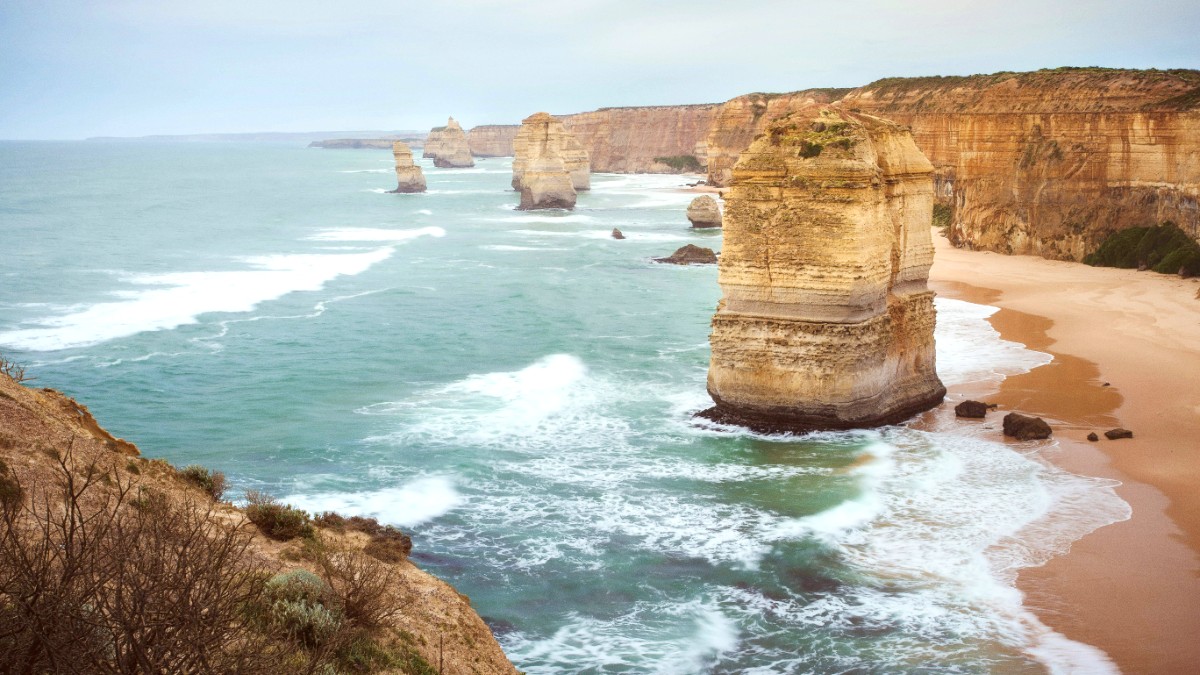
Victoria, Australia
Australian cuisine blends British colonial roots with Asian and Mediterranean influences, creating a dynamic and diverse food scene. The Great Ocean Road region specifically celebrates its fresh, local produce, often with a strong emphasis on seafood, given its coastal location.
The food culture is generally relaxed and informal, mirroring the Australian way of life.
Most establishments are casual; formal attire is not needed.
Generally not needed for cafes. Reservations are highly recommended for popular restaurants during weekends, peak season, or public holidays.
Not customary or expected. Rounding up or leaving 5-10% in fine dining shows appreciation but is not an obligation.
A classic: freshly caught local fish (flake, snapper) battered or grilled, with hot chips and lemon.
Widely available in all coastal towns.
Look for fresh oysters, local mussels, prawns. In Apollo Bay, you might find crayfish, simply grilled.
Seasonally available and fresh.
A classic Australian snack: savory minced beef and gravy in a flaky pastry crust.
Available at bakeries, general stores, and petrol stations.
Sponge cake squares dipped in chocolate sauce, coated in desiccated coconut. Found in bakeries and cafes.
Traditional biscuits from oats, coconut, and golden syrup, originally sent to soldiers during WWI. Chewy and sweet.
Limited but present, mainly in Lorne (e.g., MoVida Lorne at the Lorne Hotel, known for Spanish tapas with a local twist) and some upscale restaurants in Torquay and Warrnambool.
Most towns present a good selection of casual dining restaurants, serving modern Australian cuisine, Italian (pizza/pasta), Asian, and gastropub fare.
Fish and chip shops are abundant along the coast, creating takeaway meals. Bakeries are excellent for pies, sausage rolls, pastries, sandwiches, and fresh bread. They create quick and affordable options.
Increasingly common and widely available in cafes and restaurants, especially in tourist areas. Many menus will label dishes as V (vegetarian) or VG (vegan). Vegetarian choices are usually straightforward to find. Vegan options need a bit more searching in smaller towns, but most cafes feature plant-based milk alternatives for coffee.
Many cafes and restaurants feature gluten-free bread, pasta, and other options. Always inform staff clearly about any allergies (e.g., nuts, dairy, shellfish) when ordering. Australian food safety standards mean that staff are often well-informed about cross-contamination risks, but clear communication is useful.
Visit berry farms for seasonal produce and 'pick your own' opportunities. Explore local produce stalls.
Explore cool-climate wineries. Many present cellar door tastings, allowing you to sample local wines.
Sample craft beers at local breweries like Forrest Brewing Company.
Consider a picnic at a scenic lookout or a classic "parma night" at a pub.
Sponge cake squares dipped in chocolate sauce and coated in desiccated coconut.
Found in bakeries and cafes.
Traditional biscuits made from oats, coconut, and golden syrup, originally sent to soldiers during WWI.
Chewy and sweet.
Limited dedicated Halal or Kosher restaurants along the Great Ocean Road. It is best to check with specific establishments beforehand or prepare your own meals from supermarket-bought certified products. Larger supermarkets in Warrnambool or Geelong might include a small selection of Halal/Kosher products.
Use online search tools (e.g., HappyCow for vegan/vegetarian options, Zomato or Yelp for general reviews and filters). Local visitor information centers present current dining guides.
Visit berry farms (e.g., Gentle Annie Berry Farm near Apollo Bay) for fresh seasonal produce and sometimes "pick your own" opportunities. Explore local produce stalls or small shops selling gourmet cheeses, jams, and other regional specialties.
Explore cool-climate wineries in the Otway hinterland (e.g., Otway Estate Winery & Brewery). Many present cellar door tastings, allowing you to sample local wines and learn about their production. Sample craft beers at local breweries.
Seasonal food festivals, like the Apollo Bay Seafood Festival (held in February), display local produce and culinary talent. Check local tourism calendars or council websites for specific dates during your visit.
Most cafes and modern restaurants display labeled vegetarian options. Vegan choices are increasingly available, especially in larger towns.
Plant-based milk options are common.
Many establishments feature gluten-free choices. Always communicate any allergies clearly to staff when ordering.
Australian food safety standards promote allergen awareness.
Enjoy local catches like fish, prawns, and mussels, often prepared simply to highlight their natural flavor.
Experience Australia's strong coffee scene with flat whites and a range of breakfast/brunch options.
Discover cool-climate wines and craft beers from the Otway hinterland, with cellar door tastings.
Halal and Kosher dedicated restaurants are limited. It is best to check with specific establishments beforehand or prepare your own meals from supermarket-bought certified products.